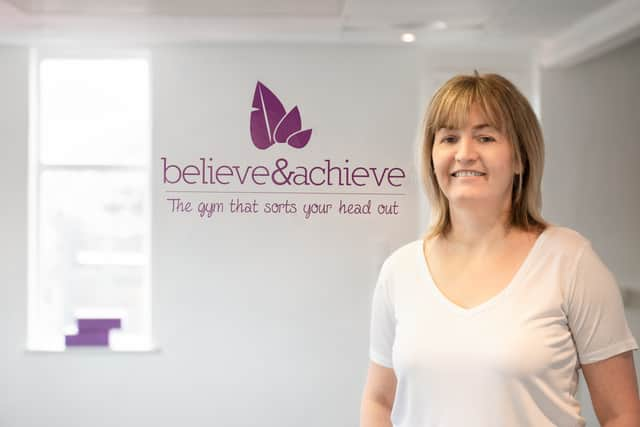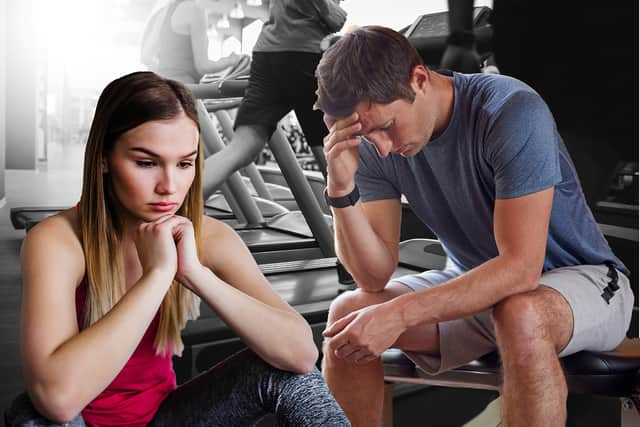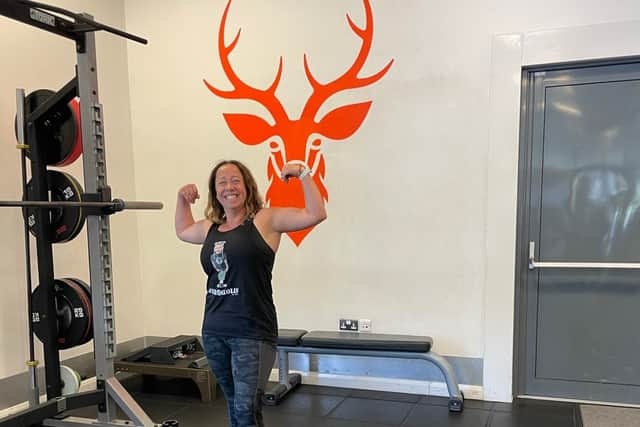Gymtimidation: what is gym anxiety - and how to overcome it
and live on Freeview channel 276
For many people, going to the gym is a part of their routine. Whether it’s using the facilities or taking part in fitness classes or visiting every day or twice a week, everyone has their own approach.
One thing gym-goers may have in common though is feelings of nervousness when stepping out of the changing room and on to the gym floor, particularly when visiting for the first time. There is also some suggestion that women feel more fearful than men when going to workout in this public environment.
Advertisement
Hide AdAdvertisement
Hide AdClaire Moore, who runs a women’s only gym called Believe and Achieve in Sheffield, South Yorkshire, said: “I have met so many amazing women who successfully manage their homelife, families, careers and finances, but don’t have the confidence to step into a large gym. We convince ourselves that everyone else knows exactly what they are doing, and we are bound to be the most out-of-shape person in the entire place. Add in bright lights, big open spaces, confusing machines and loud music and many of us would rather stay feeling unhealthy than put ourselves through the trauma of even walking through the door.”
But, we all know that exercising is a great way of keeping fit and healthy, and the advantage of the gym is that it gives you a specific space to workout and access to things such as specialist apparatus and machinery and professionals like personal trainers. So, it’s important to be able to overcome any feelings of anxiety linked to the gym and learn to be able to enjoy it instead.
So, just what is “gymtimidation”, why do people feel it, how can you overcome it, and do women really feel more pressure than men? NationalWorld spoke to a psychologist, personal trainers and gym users to try to get to the bottom of it.


What is “gymtimidation”?
The word “gymtimidation” is a blending of the words “gym” and “intimidation” and therefore refers to people feeling intimidated when they are performing exercise in this public space. This is usually linked to the fact that there are other people there and people feel like they are on show or exposed and could be being watched by others.
Advertisement
Hide AdAdvertisement
Hide AdAnna Sergent, a psychologist and personal trainer, said: “Gymtimidation” occurs when a person feels like an imposter or feels inadequate. They may also feel self-conscious about their physique or the way they look in their gym clothes. People who feel this way may constantly compare themselves to other gym-goers who may appear confident.”


Why do people feel “gymtimidation”
Sergent said there are many reasons people can feel “gymtimidation”. They are listed below:
- Being unsure of how to use the equipment correctly
- Being self-conscious about other gym-goers watching
- Being worried about being perceived as unattractive whilst working out
- Fear of excessive sweating
- Having to share the equipment during busy times and being unsure about the gym etiquette regarding this
- Feeling not fit enough in comparison to other gym-goers
- Having a sense of low self-esteem and feeling inadequate
- Feeling too exposed in the changing room
She added that people can feel like they are imposters, particularly in certain areas of the gym because “there is a common belief that the gym floor is mostly for men and the studios and the classes for women”.
How can you overcome “gymtimidation”?
If you have “gymtimidation”, there are things you can do to combat it. Sergent has put together some helpful tips below:
- Visit a few gyms first before making a decision about enrolling and use free entry passes if available
- Get to know the gym and the equipment available
- Ask a personal trainer or gym staff for help
- Ask a family member, friend or loved one to go with you
- Start with simple exercises to ease yourself into the workout
- Watch YouTube tutorials from qualified personal trainers to educate yourself on new exercises you can try at the gym
- Stick to the type of exercise that you enjoy


Advertisement
Hide AdAdvertisement
Hide AdShe also advised people to try to stop comparing themselves to other gym-goers. “Everyone suffers from some sort of complex when it comes to exercise or the way their bodies look so just try to concentrate on the reason why you joined the gym, your goals and technique, and the form of your exercises.”
Moore said that “gymtimidation” can lead to a vicious cycle. She said: “We feel unfit and decide we want to do something about it, but feel too unfit and nervous to do it, so don’t start then feel worse and more nervous, so then we are even less likely to start”. She has the following advice for people wishing to beat it:
- Get a basic workout sorted and commit to learning one new piece of equipment each week
- Zone out, get your headphones on, play your favourite music playing and focus on you
- Start light with the weights and build up your strength and your confidence at the same time
Do women feel “gymtimidation” more than men?
There’s no definitive answer to this question as it depends on the experience of individuals, but Sergent said that in her work as a personal trainer she has heard women voice various concerns about being in the gym. “I hear my female clients, as well as my female friends, making comments about the gym being male dominated environment where they don’t feel that safe in terms of being harassed or stared at. Also, the gym equipment seems heavy and awkward to work out. It is as if it was designed for male gym-goers more than female.”
Kirsten Scheider, a women’s fitness expert and personal trainer working under the name Wolf Approach Fitness, said that she decided to create a programme to help women to feel more confident in the gym after noticing more women were affected by “gymtimidation”. She said: “I noticed that a lot of my clients predominantly used cardio machines such as the treadmill whilst the vast array of quality equipment didn’t get a look in. The want was obviously there, they wouldn’t be working with a personal trainer if they didn’t want to push their limits just a bit, they just needed a little help to step outside their comfort zone. So, I have made it my life’s mission to get more women loving the free weights section of their gym.”
Advertisement
Hide AdAdvertisement
Hide AdScheider’s programme includes information such as correct form and technique for various exercises, an explanation of what each piece of gym equipment is used for, weights room mentality, basic gym etiquette and goal setting. She said: “Following my tips, my clients soon realised that common fears such as not fitting in, not being able to do something, people judging and general embarrassment existed mainly in their mind.”


NationalWorld also spoke to gym-goers for their opinions. Here’s what they had to say.
Sue Bordley, aged 51, author of water safety book Have Fun Be Safe, has been swimming at her local pool in Wirral, Merseyside, every day for the past five years. She said: “I certainly don’t crumble if anyone tries to intimidate me. It is largely men who do it. Sometimes groups of them will get into the lane and start thrashing around, doing front crawl where most people do breaststroke because it’s not a very large pool. They’re not breaking any rules, but they splash other swimmers in the face and are visibly annoyed that you’re in their way. I refuse to be bullied out of the lane though, but I can always sense they’d prefer me to leave. I was there first though and I’m entitled to swim in any section of the pool I wish so I will.
“I’d say you get about one episode of intimidating behaviour a week, but I don’t let it put me off. I noticed recently that some people hover before entering the pool, not sure which section to go in. When I arrive at the pool, I strut to the lane as if it’s reserved for me. Swimming has given me that confidence. As for any other ways I could be intimidated, after five years of swimming, I feel confident about my body, and happily walk around the pool next to the younger women in their bikinis. I’m not model-perfect, but I think my body’s the best it can be for my age and genetic makeup.”


Advertisement
Hide AdAdvertisement
Hide AdBharti Patel, aged 41, has been using various gyms since was 18-years-old and her relationship with them has changed over the years. She said: “Pre-children I was a very confident gym user as long as someone told me what to use, but I went to mixed gender gyms so I avoided the "men’s" area which is pretty intimidating to females. The equipment looks different, it’s full of men lifting heavy and it feels like you are invading their space.
“So, for many years, I stuck with what is often considered the more female friendly machines; assisted weights, lighter dumbbells and cardio. I also never touched a piece of equipment unless someone had shown me and I was too scared to ask unless I had booked a personal trainer. Going back after having children was really scary as my body had changed, I was older and I hated cardio - and to be honest still do. So, finding my way around a gym again was really hard, I felt embarrassed and nervous. I wasn’t sure what was right for me and what to use.”
For Patel, seeking the help of multiple personal trainers helped her to gain her to overcome her “gymtimidation”. She said: “I have learnt a lot myself and finally I am confident in the gym, including in the "men’s area" and lifting free weights. I have finally realised no one is looking at me and they don’t care what I’m doing. Everyone is in there worrying about the same things.”
While many women are vocal about this issue, men have also stepped up and talked about how they have been "gymtimidated". Dave Danna, a 30-year-old accountant and Youtube personality, gained over 2,000 likes on a tweet he published with a photo of himself in the gym. He said he did so because “gym anxiety is real”.
Comment Guidelines
National World encourages reader discussion on our stories. User feedback, insights and back-and-forth exchanges add a rich layer of context to reporting. Please review our Community Guidelines before commenting.
